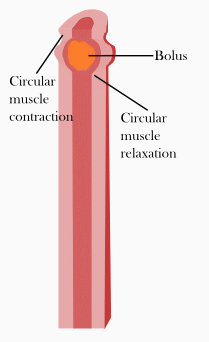Gastrointestinal physiology
Gastrointestinal Physiology[edit]

Gastrointestinal physiology refers to the study of the functions of the gastrointestinal tract (GI tract), which is responsible for the digestion and absorption of nutrients. The GI tract is a complex system that includes various organs such as the esophagus, stomach, small intestine, and large intestine.
Structure of the Gastrointestinal Tract[edit]
The gastrointestinal tract is a continuous tube that extends from the mouth to the anus. It is divided into several sections, each with specific functions:
- Mouth: The entry point for food, where mechanical digestion begins with chewing and chemical digestion starts with enzymes in saliva.
- Esophagus: A muscular tube that transports food from the mouth to the stomach through coordinated muscle contractions known as peristalsis.
- Stomach: A sac-like organ where food is mixed with gastric juices, initiating the breakdown of proteins.
- Small Intestine: The primary site for digestion and absorption of nutrients. It consists of three parts: the duodenum, jejunum, and ileum.
- Large Intestine: Absorbs water and electrolytes, forming and storing feces. It includes the cecum, colon, and rectum.
Functions of the Gastrointestinal Tract[edit]
The main functions of the gastrointestinal tract include:
- Digestion: The breakdown of food into smaller components that can be absorbed into the bloodstream. This involves both mechanical and chemical processes.
- Absorption: The uptake of nutrients from the digestive tract into the blood or lymphatic system.
- Motility: The movement of food through the GI tract, primarily through peristalsis and segmentation.
- Secretion: The release of digestive juices and enzymes that aid in the breakdown of food.
- Excretion: The elimination of indigestible substances and waste products from the body.
Peristalsis[edit]
Peristalsis is a crucial process in gastrointestinal physiology, involving rhythmic contractions of the smooth muscles in the GI tract. These contractions propel food and waste products through the digestive system. Peristalsis is essential for moving food from the esophagus to the stomach and through the intestines.
Regulation of Gastrointestinal Function[edit]
The function of the gastrointestinal tract is regulated by both the nervous system and endocrine system.
- Nervous System: The enteric nervous system (ENS) is a network of neurons that governs the function of the GI tract. It works in conjunction with the central nervous system (CNS) to coordinate digestive activities.
- Endocrine System: Various hormones, such as gastrin, secretin, and cholecystokinin, play roles in regulating digestive processes, including enzyme secretion and motility.
Related Pages[edit]
Ad. Transform your life with W8MD's Budget GLP-1 injections from $75


W8MD offers a medical weight loss program to lose weight in Philadelphia. Our physician-supervised medical weight loss provides:
- Weight loss injections in NYC (generic and brand names):
- Zepbound / Mounjaro, Wegovy / Ozempic, Saxenda
- Most insurances accepted or discounted self-pay rates. We will obtain insurance prior authorizations if needed.
- Generic GLP1 weight loss injections from $75 for the starting dose.
- Also offer prescription weight loss medications including Phentermine, Qsymia, Diethylpropion, Contrave etc.
NYC weight loss doctor appointmentsNYC weight loss doctor appointments
Start your NYC weight loss journey today at our NYC medical weight loss and Philadelphia medical weight loss clinics.
- Call 718-946-5500 to lose weight in NYC or for medical weight loss in Philadelphia 215-676-2334.
- Tags:NYC medical weight loss, Philadelphia lose weight Zepbound NYC, Budget GLP1 weight loss injections, Wegovy Philadelphia, Wegovy NYC, Philadelphia medical weight loss, Brookly weight loss and Wegovy NYC
|
WikiMD's Wellness Encyclopedia |
| Let Food Be Thy Medicine Medicine Thy Food - Hippocrates |
Medical Disclaimer: WikiMD is not a substitute for professional medical advice. The information on WikiMD is provided as an information resource only, may be incorrect, outdated or misleading, and is not to be used or relied on for any diagnostic or treatment purposes. Please consult your health care provider before making any healthcare decisions or for guidance about a specific medical condition. WikiMD expressly disclaims responsibility, and shall have no liability, for any damages, loss, injury, or liability whatsoever suffered as a result of your reliance on the information contained in this site. By visiting this site you agree to the foregoing terms and conditions, which may from time to time be changed or supplemented by WikiMD. If you do not agree to the foregoing terms and conditions, you should not enter or use this site. See full disclaimer.
Credits:Most images are courtesy of Wikimedia commons, and templates, categories Wikipedia, licensed under CC BY SA or similar.
Translate this page: - East Asian
中文,
日本,
한국어,
South Asian
हिन्दी,
தமிழ்,
తెలుగు,
Urdu,
ಕನ್ನಡ,
Southeast Asian
Indonesian,
Vietnamese,
Thai,
မြန်မာဘာသာ,
বাংলা
European
español,
Deutsch,
français,
Greek,
português do Brasil,
polski,
română,
русский,
Nederlands,
norsk,
svenska,
suomi,
Italian
Middle Eastern & African
عربى,
Turkish,
Persian,
Hebrew,
Afrikaans,
isiZulu,
Kiswahili,
Other
Bulgarian,
Hungarian,
Czech,
Swedish,
മലയാളം,
मराठी,
ਪੰਜਾਬੀ,
ગુજરાતી,
Portuguese,
Ukrainian